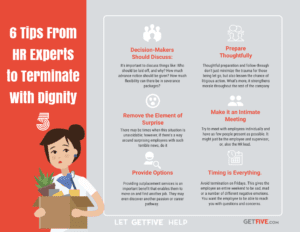
It’s never easy to terminate an employee, no matter the circumstances. If you’re in HR, you probably put a lot of consideration into how to protect the company and follow proper legal procedures. What you may not put as much thought into is how to handle the termination ethically from the employee’s standpoint.
Becoming unemployed is a great life trauma. So many companies needlessly compound employees’ shock and emotional distress by handling their termination poorly. When it’s done with dignity and grace, both the company and the employee can approach the next chapter of life with optimism and mutual respect.
Twenty years ago GetFive coined the phrase “termination with dignity” because there was a huge problem with termination practices. While today progress has been made, issues remain. If you’ll soon be facing a termination, consider this advice from HR experts.
Decision-maker discussions
Decision-makers should meet regularly and numerous times long before termination occurs, if possible. It’s important to discuss things like: Who should be laid off, and why? How much advance notice should be given? How much flexibility can there be in severance packages? Should employees leave immediately or not? Will there be any kind of backlash? What do we tell the rest of the staff?
Thoughtful preparation
Thoughtful preparation and follow-through don’t just minimize the trauma for employees being let go, but also lessen the chance of litigious action. What’s more, they strengthen trust and morale throughout the rest of the company. Long before you meet with employees, have your script ready so you can explain rationale and next steps. You shouldn’t read from it, but if you’re nervous, it helps provide points you can reference so you don’t stumble.
Remove the element of surprise
No one likes an unexpected email to meet them in 10 minutes in the boss’s office. There may be times when this situation is unavoidable; however, if there’s a way around surprising employees with such terrible news, do it. Communicate often about company developments so that employees feel informed. Provide as much advance information as possible, especially when the rumor mill is likely to begin churning with a company merger or acquisition.
Make it an intimate meeting
Meeting with a group of people to tell them they are losing their jobs should be avoided. Try to meet with employees individually and have as few people present as possible. It might just be the employee and supervisor, or, also the HR lead. It’s a difficult conversation and people get emotional. They don’t want an audience. Afterward, let the employee have some time alone to gather themselves and use the phone if necessary. If they don’t want to pack their desk, offer to ship things home.
Provide options
Employees want to feel like they have some control over their story. Allowing someone to resign rather than be terminated might be an option. Providing outplacement services is an important benefit that enables them to move on and find another job. They may even discover another passion or career pathway. This extra step not only shows that the company cares, but it empowers them to find a new position sooner and on their own terms.
Timing
Avoid termination on Fridays. This gives the employee an entire weekend to be sad, mad or a number of different negative emotions. You want the employee to be able to reach you with questions and concerns, which is difficult if the following day is Saturday. If dismissal on Friday is unavoidable, provide them your cell number or give them the company’s EAP 24-hour hotline number if they need it.









